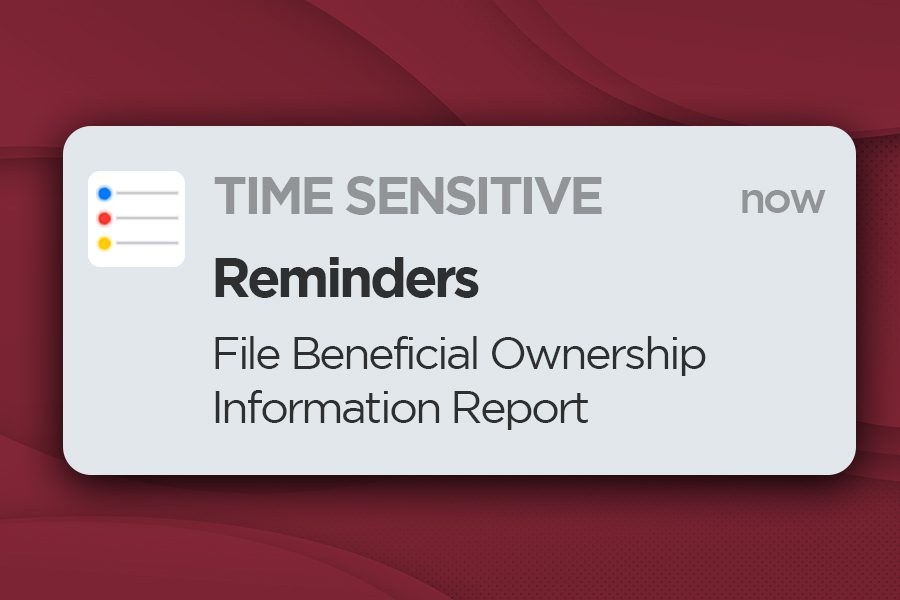In this article:
Is Your Business Affected by the New Beneficial Ownership Reporting Requirements?
How Do You File Your Beneficial Ownership Reporting Requirements?
What are the Deadlines for Filing Your Beneficial Ownership Requirements?
Why Do the Beneficial Ownership Requirements Matter?
Frequently Asked Questions about the Beneficial Ownership Requirements.
Understanding New Beneficial Ownership Reporting Requirements for Small Businesses
Starting January 1, 2024, the Corporate Transparency Act requires many companies to report information about their beneficial owners to the Financial Crimes Enforcement Network (FinCEN). The goal of these requirements is to increase transparency, reduce illicit finance, and protect national security by identifying the individuals who ultimately own or control these companies.
Filing beneficial ownership information is easy, secure, free, and takes about 20 minutes for most businesses. It only needs to be completed once, unless there are changes. This guide will help you understand and complete the process smoothly.
Is Your Business Affected?
If your business is a corporation, limited liability company (LLC), or another entity created by filing with a state or Tribal authority, you are required to file beneficial ownership information. Additionally, foreign companies registered to do business in the U.S. are required to report. However, large companies already reporting ownership details to Federal regulators are generally exempt from this requirement.
There are 23 types of entities exempt from the beneficial ownership reporting requirements, including:
- Securities reporting issuer (e.g., publicly traded companies, companies filing with the SEC, major financial institutions).
- Governmental authority (e.g., federal agencies, state entities, local government units).
- Bank (e.g., national banks, state-chartered banks, community banks).
- Credit union (e.g., federal credit unions, state credit unions, corporate credit unions).
- Depository institution holding company (e.g., bank holding companies, savings and loan holding companies, parent holding companies).
- Money services business (e.g., currency dealers, money transmitters, prepaid access providers).
- Broker or dealer in securities (e.g., stock brokers, investment brokers, financial market brokers).
- Securities exchange or clearing agency (e.g., national stock exchanges, commodity clearinghouses, registered clearing agencies).
- Other Exchange Act registered entity (e.g., mutual funds, registered investment funds, publicly traded investment trusts).
- Investment company or investment adviser (e.g., registered investment advisers, mutual funds, private equity funds).
- Venture capital fund adviser (e.g., early-stage venture funds, seed capital funds, venture investment managers).
- Insurance company (e.g., life insurance providers, property and casualty insurers, health insurance companies).
- State-licensed insurance producer (e.g., insurance agents, insurance brokers, underwriters).
- Commodity Exchange Act registered entity (e.g., futures commission merchants, commodity trading advisors, commodity pool operators).
- Accounting firm (e.g., CPA firms, tax consultancy firms, audit service providers).
- Public utility (e.g., electric utility companies, water supply services, natural gas providers).
- Financial market utility (e.g., payment clearing systems, financial settlement networks, central counterparties).
- Pooled investment vehicle (e.g., mutual funds, hedge funds, real estate investment trusts).
- Tax-exempt entity (e.g., charitable organizations, non-profit organizations, religious institutions).
- Entity assisting a tax-exempt entity (e.g., supporting organizations, charitable trusts, grant-making foundations).
- Large operating company (e.g., multinational corporations, established public companies, conglomerates).
- Subsidiary of certain exempt entities (e.g., subsidiaries of exempt banks, subsidiaries of tax-exempt entities, subsidiaries of public utilities).
- Inactive entity (e.g., dormant companies, shell corporations with no business activity, inactive LLCs).
For more information on exemptions, visit FinCEN’s Small Entity Compliance Guide, which may help determine whether your company meets an exemption.
How to File
What You Will Need Before You Get Started
Reporting companies are required to provide basic information about their beneficial owners, including their names, addresses, and dates of birth. Details about company applicants may also be required in some cases. Filing can be done easily without the need for an accountant or lawyer, making it an accessible process for small business owners.
The key pieces of information that need to be reported include:
- Full legal name of each beneficial owner.
- Date of birth of each beneficial owner.
- Current residential or business address of each beneficial owner.
- Unique identifying number (e.g., passport or driver’s license) and issuing jurisdiction.
Having these details ready in advance will help make the filing process smoother and faster.
Step-by-Step Guide to Filing a Beneficial Ownership Information (BOI) Report
Visit the BOI Website:
- Visit the BOI Website at boiefiling.fincen.gov/fileboir.
- Click on “File a Report” to start your Beneficial Ownership Information Report.
- Select “Initial Report” if this is your first time filing.
Enter Company Information:
- Enter your company name.
- Skip “Alternative/DBA Names” if not applicable.
- Select “United States” if your company was formed in the U.S.
- Provide the state where the company was registered and enter the company address.
Enter Company Applicant Information:
- Provide details for the person who filed the company paperwork (e.g., tax accountant).
- Enter their last name, first name, date of birth, and business address.
- Upload an identification document (e.g., driver’s license).
- Only companies created or registered in 2024 or later need to report Company Applicants.
Enter Beneficial Owner Information:
- Provide your last name, first name, date of birth, and address.
- Enter the identifying document number and upload an image.
- If there are additional Beneficial Owners, click “Add a Beneficial Owner” and repeat this step.
Submit the Report:
- Enter your first name, last name, and email address.
- Certify that the information provided is accurate by checking the certification box.
- Complete the captcha and click “Submit.”
Save Your Confirmation:
- Download and save the confirmation page for your records.
For additional guidance, you can watch FinCEN’s Five-Minute Demo below for a quick and easy overview of the filing steps:
If you need further assistance or have specific questions, you can also refer to FinCEN’s Beneficial Ownership Information page.
Filing Deadlines
Update: On December 3, 2024, the U.S. District Court for the Eastern District of Texas issued a preliminary injunction that temporarily blocks the enforcement of the Corporate Transparency Act (CTA) across the United States. This injunction will remain in place while the court hears a related case.
- New companies: Those that were registered in 2024 have 90 calendar days to file after their creation or registration becomes effective. Starting in 2025, newly registered companies will be required to file within 30 days
For companies with straightforward ownership structures, the filing process is estimated to take less than 20 minutes.
What happens if my company does not report BOI in the required timeframe?
If you fail to report beneficial ownership information on time, you may face penalties, including fines of up to $500 per day and criminal penalties such as imprisonment for up to two years and/or fines of up to $10,000. FinCEN also considers enforcement factors when determining the appropriate response.
There is a safe harbor from penalties if you voluntarily correct any inaccurate information within 90 days of the original filing deadline.
Why This Matters
The Corporate Transparency Act aims to create a more transparent financial environment by requiring many businesses to disclose information about their beneficial owners. This helps prevent illicit financial activities, such as money laundering and fraud, by making it more difficult for bad actors to conceal their identities. By complying with these new regulations, small businesses contribute to a safer and more secure financial system for everyone.
FAQs
Who is considered a beneficial owner?
- A beneficial owner is an individual who exercises substantial control over a company or owns or controls at least 25% of its ownership interests.
What constitutes substantial control?
- Substantial control includes serving as a senior officer, having authority over significant decisions, or having substantial influence over the company.
Are sole proprietorships required to file BOI reports?
- No, sole proprietorships are not required to file BOI reports.
Do trusts need to file BOI reports?
- Generally, trusts are not required to file BOI reports unless they are created by filing with a state or Tribal authority.
Can a company applicant be removed from a BOI report?
- No, once reported, a company applicant cannot be removed from a BOI report.
How do I report multiple beneficial owners?
- The BOI E-Filing System allows you to add multiple beneficial owners in a single report.
Is an inactive entity exempt from BOI reporting?
- Yes, inactive entities meeting specific criteria are exempt from BOI reporting.
Can I update my BOI report after filing?
- Yes, you can update your BOI report if there are changes to the reported information.
Who can access my BOI information?
- Access is restricted to authorized government authorities and financial institutions under specific circumstances.
Is BOI information protected under the Freedom of Information Act (FOIA)?
- Yes, BOI information is exempt from disclosure under FOIA.
For additional guidance, check out FinCEN’s Info Session on How to Comply with New Reporting Requirements. If you need to create a FinCEN ID, you can do so here.
Stay ahead of the deadline to ensure your business complies with these requirements and continues to operate smoothly.
Additional Resources
- BOI E-Filing System: File your beneficial ownership information here.
- FinCEN ID Creation: Create your FinCEN ID here.
- FinCEN FAQs: Find answers to common questions on the FinCen FAQs page.
- Learn About Beneficial Ownership with Jim Bedsole: Watch Jim Bedsole, the retired Chief Risk and Compliance Officer at BankSouth, discuss the new reporting requirements with Athens CEO. View the article and video here.
- BankSouth Beneficial Ownership Page: Visit BankSouth’s dedicated page for more resources and additional information on beneficial ownership requirements.
FDIC-Insured – Backed by the full faith and credit of the U.S. Government
FDIC-Insured – Backed by the full faith and credit of the U.S. Government




